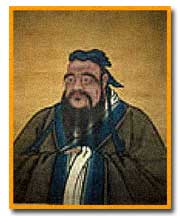Confucius (circa
551-479 BC)
China

According to tradition, Confucius was born in the province of
Lu in China in 551 BC. In spite of his father's death when he
was very young and the family's fall into poverty, Confucius (actually
named K'ung Ch'iu and later called Master K'ung or K'ung Fu-tzu)
received a good education. His education helped him to start a
successful political career at an early age. His goal was to restore
peace and orderliness to Lu, but he was dismissed from his job
because corrupt individuals were jealous of his influence.
Confucius decided to give up public service and became a teacher,
believing that he could change the world better by influencing
the leaders of the future. The overlying message to all that Confucius
taught was if people are to achieve a state of orderliness and
peace, they must return to traditional values of virtue. He taught
that a person's job was to focus on the highest concepts of behavior,
even if that appeared to be impractical or foolish. A person can
learn what is right and good behavior by studying the lives of
the sage-kings and following rituals thoroughly and carefully.
At the age of 52, Confucius finally had the opportunity to put
his ideas into practice when he became the chief magistrate of
the city of Chung-tu. There was so much improvement in the behavior
of the people that the next year he became the Minister of Crime
for the province of Lu. The results were that crime was nearly
eliminated and warring barons were brought under the ruler's control.
Lu became a powerful and influential province, which only ended
because the people eventually began to neglect Confucius' teachings.
Despite popular belief, Confucius never claimed to be a religious
leader or divine being. Elements of Confucianism can be seen in
every form of government, religion, or culture. His influence
could be surprising since Confucius did not write any of his teachings
down. His students wrote down what he taught in The Analects.
Quotations from the Analects:
"To have friends come from far away--isn't that a joy?"
"To see what is right and not to do it, is want of courage."
"The essence of knowledge is, having it, to apply it; not
having it, to confess your ignorance."
"To be wronged is nothing unless you continue to remember
it."
"It is only the wisest and the stupidest that cannot change."
"Everything has beauty, but not everyone sees it."
"Our greatest glory is not in never failing, but in rising
every time we fall."
Discussion Questions
What is truth to Confucius?
How would Confucius answer the question: What is more important
in your life, truth or beauty?
Choose your favorite quote listed above, or search for others
at http://www.quoteworld.org/author.php?thetext=Confucius
Why do you like the quote you chose and how does it apply to the
world today?
If Confucius was running for President of the United States this
year, how would his plan for the War in Iraq be similar to those
of George Bush and John Kerry? How would it be different? What
do you think his plan would be to fight the war on terror?
What would Confucius say to students who are not willing to work
hard in school?
What is one place in the United States government that you see
Confucius' influence?
To learn more about Confucius, follow these links:
http://www.quoteworld.org/author.php?thetext=Confucius
http://plato.stanford.edu/entries/confucius/
http://www.cifnet.com/~geenius/kongfuzi/
http://www.wsu.edu:8080/~dee/CHPHIL/CONF.HTM
http://www.comparative-religion.com/confucianism/
http://chineseculture.about.com/msubconfucius.htm?once=true&

